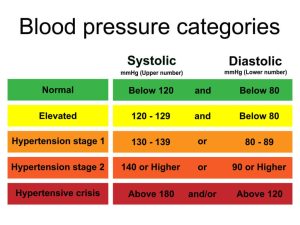health
High Blood Pressure in Pregnancy

Introduction
Pregnancy is an extraordinary journey for women, marked by various health considerations that significantly impact the well-being of both mother and baby. One such concern that warrants close attention is high blood pressure, or hypertension, which can either preexist before pregnancy or develop during gestation. In this comprehensive article, we aim to explore the intricacies of high blood pressure in pregnancy, encompassing its types, prevalence, potential complications, recognition, treatment approaches, and recent developments in diagnostics.
Understanding High Blood Pressure
What is High Blood Pressure?
High blood pressure is characterized by elevated pressure in the blood vessels, a crucial health parameter measured as two figures (e.g., 140/85 mm Hg). The systolic pressure represents the pressure during heart contraction, while the diastolic pressure denotes the pressure when the heart is at rest. Normal blood pressure is generally considered to be below 140/90 mm Hg.
Types of High Blood Pressure in Pregnancy
- Pre-existing High Blood Pressure
- Some women enter pregnancy with a history of hypertension, often necessitating ongoing treatment.
- Medication adjustments may be required, particularly for drugs that pose potential harm to the developing baby, such as Angiotensin-converting enzyme (ACE) inhibitors, Angiotensin-II receptor antagonists (AIIRAs), and diuretics.
- Gestational High Blood Pressure
- This type develops after the 20th week of pregnancy and typically returns to normal within six weeks postpartum.
- Distinguished by the absence of protein in urine, unlike pre-eclampsia.
- Pre-eclampsia and Eclampsia
- A more severe condition involving high blood pressure, affecting multiple organs, and characterized by the presence of protein in urine.
- Pre-eclampsia may progress to eclampsia, a critical phase marked by seizures.

Image by: queens.org
Pre-existing high blood pressure
Some women already have high blood pressure (hypertension) before they become pregnant and they may be on treatment for this. Your medication may need to be changed, so it is important to see a healthcare professional before, or as soon as, you know you are pregnant.
Some women are found to have high blood pressure before they are 20 weeks pregnant. (If high blood pressure is first discovered before you are 20 weeks pregnant, this usually means that you had previously undetected high blood pressure before you were pregnant.)
So, high blood pressure before 20 weeks of pregnancy is not caused by pregnancy but is pre-existing, or chronic, high blood pressure. There are various causes. See the separate leaflet called High Blood Pressure (Hypertension).
If you have pre-existing high blood pressure, you have an increased risk of developing pre-eclampsia during your pregnancy (see below).
Note: if you are taking medicines to treat high blood pressure then, ideally, you should have this reviewed before you become pregnant. Some medicines that are used to treat high blood pressure should not be taken during pregnancy – for example, medicines called:
- Angiotensin-converting enzyme (ACE) inhibitors.
- Angiotensin-II receptor antagonists (AIIRAs) – sometimes called angiotensin receptor blockers (ARBs).
- ‘Water’ tablets (diuretics).
This is because these medicines may harm a developing baby. If you are taking one of these medicines then it is very likely that your medicine will be changed to another medicine that is not known to harm a developing baby.
Gestational high blood pressure
Some women can develop new high blood pressure during their pregnancy. This is called gestational high blood pressure (or hypertension) or pregnancy-induced high blood pressure (or hypertension).
Gestational high blood pressure is high blood pressure that develops for the first time after the 20th week of pregnancy. Doctors can confirm this type of high blood pressure if you do not go on to develop pre-eclampsia during your pregnancy (see below) and if your blood pressure has returned to normal within six weeks of giving birth. If you have gestational high blood pressure, you do not have protein in your urine when it is tested by your midwife or doctor during your pregnancy.
Note: some women may be found to have new high blood pressure after 20 weeks of pregnancy. At first, they may not have any protein in their urine on testing. However, they may later develop protein in their urine and so be diagnosed with pre-eclampsia (see below). You are only said to have gestational hypertension if you do not go on to develop pre-eclampsia during your pregnancy.
Pre-eclampsia and eclampsia
Pre-eclampsia is a condition that can affect some women who develop new high blood pressure after the 20th week of their pregnancy. Pre-eclampsia can also sometimes develop in women who have high blood pressure before they are pregnant (pre-existing high blood pressure) or in women who have protein in their urine before they are pregnant (for example, due to kidney problems).
Pre-eclampsia not only causes high blood pressure; it also affects other parts of your body such as your kidneys, liver, brain and blood clotting system. Pre-eclampsia causes protein to leak from your kidneys into your urine. If you have pre-eclampsia, you will have high blood pressure and protein will be found in your urine when it is tested. Pre-eclampsia gets better within six weeks of you giving birth.
Eclampsia can be a complication of pre-eclampsia. In eclampsia, a woman with pre-eclampsia has one or more fits (seizures or convulsions). This is a serious condition. The aim is to detect and treat pre-eclampsia successfully to try to prevent eclampsia from developing.
How common is high blood pressure during pregnancy?
- Approximately 1 in 10 pregnant women experience issues with high blood pressure.
- Pre-existing hypertension affects up to 3 in 100 pregnant women.
- Gestational high blood pressure occurs in approximately 4 to 8 in 100 pregnancies.
- Pre-eclampsia develops in around 2 to 8 in 100 pregnancies.
Possible Complications
- Mild-to-moderate high blood pressure usually poses low risks.
- Severe high blood pressure and pre-eclampsia elevate risks for both mother and baby.
- Associated risks include an increased likelihood of stroke, organ damage (particularly to the kidneys and liver), blood clotting problems, severe bleeding from the placenta, poor fetal growth, premature birth, and stillbirth.

Image by: data:image/jpeg;base64,/9j
Mild-to-moderate high blood pressure
If your blood pressure remains mildly to moderately raised and you do not develop pre-eclampsia then the risk is low. Most women with high blood pressure (hypertension) during pregnancy just have mildly or moderately raised blood pressure.
However, it is important that your blood pressure and urine should be checked regularly throughout your pregnancy and that you look out for any signs of possible pre-eclampsia (see below).
Severe high blood pressure or pre-eclampsia
Severe high blood pressure, especially with pre-eclampsia, is serious.
- The risks to you as the mother include:
- An increased chance of having a stroke.
- Damage to your kidneys and liver.
- An increased risk of blood clotting problems.
- An increased risk of severe bleeding from your placenta.
- Having fits (seizures) if you go on to develop eclampsia.
- The risks to your baby include:
- An increased chance of poor growth.
- An increased chance of premature birth.
- An increased chance of stillbirth.
How do I know if I have high blood pressure whilst I am pregnant?
Many women with high blood pressure (hypertension) during their pregnancy do not have any symptoms. This is why your blood pressure is checked regularly by your doctor or midwife during your pregnancy. Your urine is also tested regularly for protein, to look for possible pre-eclampsia.
However, there are some symptoms that you should look out for that could be signs of pre-eclampsia. If you develop any of these, you should see your doctor or midwife urgently so that they can check your blood pressure and test your urine for protein. They include:
- Severe headaches that do not go away.
- Problems with your vision, such as blurred vision, flashing lights or spots in front of your eyes.
- Tummy (abdominal) pain. The pain that occurs with pre-eclampsia tends to be mainly in the upper part of the abdomen, just below your ribs, especially on your right side.
- Vomiting later in your pregnancy (not the morning sickness of early pregnancy).
- Sudden swelling or puffiness of your hands, face or feet.
- Feeling out of breath.
- Not being able to feel your baby move as much.
- Just not feeling right.
Note: swelling or puffiness of your feet, face, or hands (oedema) is common in normal pregnancy. Most women with this symptom do not have pre-eclampsia but it can become worse in pre-eclampsia. Therefore, report any sudden worsening of swelling of the hands, face or feet promptly to your doctor or midwife.

Image by: continentalhospitals.com
What is the treatment for high blood pressure in pregnancy?
If your doctor or midwife finds that your blood pressure is high during your pregnancy, they will usually check to see if you have any protein in your urine and ask you if you have any symptoms of pre-eclampsia. If your blood pressure remains high, or if you have any signs of pre-eclampsia, you will usually be seen by a specialist (an obstetrician). In order to advise on treatment, there are various questions that need to be considered by the specialist, such as:
- How severe is your high blood pressure (hypertension)?
- Is there pre-eclampsia and, if so, how severe is it?
- How far on is your pregnancy?
- What are the risks to you, the mother, and your baby? This will depend on the severity of your high blood pressure and whether or not pre-eclampsia is present.
Treatment Approaches
- For mild cases, a common recommendation includes a daily dose of aspirin (75-150 mg).
- Severe cases may necessitate urgent specialist attention, potential hospitalization, and medication such as labetalol.
- Magnesium sulfate may be administered to prevent eclampsia.

Image by: https://www.babylist.com/hello-baby/best-nausea-medication
Recent Developments
Recent advancements in diagnostic tools, specifically placental growth factor (PLGF)-based tests, have been recommended by the National Institute for Health and Care Excellence. These tests assist in assessing suspected preterm pre-eclampsia, aiding in more precise care planning and reducing unnecessary hospitalization.
Conclusion
Effectively managing high blood pressure during pregnancy is pivotal for ensuring the health and safety of both the mother and the developing baby. Regular monitoring, timely intervention, and embracing advancements in diagnostic capabilities contribute significantly to a safer and healthier pregnancy experience.
Care
Transform Your Smile with Dental Implants in Dubai

A confident smile can change the way people perceive you, and dental implants offer a remarkable way to restore both appearance and function. Dental implants have become a leading solution for individuals seeking a permanent and natural-looking replacement for missing teeth. By seamlessly integrating with the jawbone, Dental Implants Dubai provide stability and durability that other options often cannot match. From enhancing oral health to boosting self-confidence, the benefits of dental implants are extensive and transformative.
Understanding the Dental Implant Process
Dental implants are designed to replace missing teeth with results that feel and look natural. The process typically begins with a thorough evaluation to determine bone density and oral health, ensuring that the foundation is suitable for implantation. Once the assessment is complete, the implant is surgically placed into the jawbone.

Key Benefits of Dental Implants
Enhancing Aesthetic Appeal
A radiant smile plays a crucial role in self-confidence and personal presentation. Dental implant are custom-designed to match the shape, size, and color of natural teeth, creating a seamless appearance. Unlike other options, dental implants do not rely on neighboring teeth for support, ensuring a natural contour and symmetry. The result is a smile that looks authentic and enhances facial aesthetics. Individuals often notice an immediate boost in self-esteem after completing the implant process, enjoying the freedom to express themselves without hesitation.
Functional Advantages of Dental Implant
Dental implants offer more than visual enhancement. They provide a level of stability and functionality that mimics natural teeth. The secure fit allows for comfortable chewing and clear speech, restoring the ability to enjoy all types of foods without restriction. Because implants are anchored directly to the jawbone, they eliminate concerns about dentures slipping or causing discomfort. This functional reliability contributes to overall oral health by making everyday activities easier and more comfortable.
Longevity and Durability
One of the most compelling aspects of dental implant is their long-lasting nature. With proper care, dental implants can last a lifetime, making them a sustainable solution for tooth replacement. The materials used are highly resistant to decay and wear, reducing the need for frequent replacements. Regular dental check-ups and proper oral hygiene ensure that implants remain strong and functional. This combination of durability and minimal maintenance makes dental implant an excellent choice for anyone seeking a permanent solution to missing teeth.
Promoting Oral Health
Common Questions
How long does the process take?
The timeline for dental implants varies depending on individual needs. Typically, the process from initial consultation to final restoration can take several months. This period allows for proper healing and osseointegration, ensuring the implant is securely anchored and ready for the final restoration.
Is the procedure painful?
Most patients report minimal discomfort during the dental implant procedure. Local anesthesia is used to ensure a comfortable experience, and post-procedure soreness is usually manageable with over-the-counter pain relief. The process is designed to prioritize patient comfort and recovery.
Can anyone get dental implants?
While dental implants are suitable for many individuals, candidates must have sufficient bone density and good oral health. A thorough evaluation helps determine whether dental implants are the best solution. In some cases, preparatory procedures may be recommended to strengthen the jawbone before implant placement.
How do dental implants compare to other tooth replacement options?
Dental implants offer unique advantages, including long-term durability, natural appearance, and preservation of surrounding teeth. Their ability to restore function and aesthetics makes them a preferred choice for individuals seeking a permanent and reliable solution.
How should dental implants be cared for?
Caring for dental implants is similar to maintaining natural teeth. Daily brushing, flossing, and regular dental check-ups help ensure longevity. Because dental implants do not decay, they offer a consistent and reliable solution for maintaining oral health.
Why Choose Dental Implants Today
Cheapest Dental Implants in Dubai are more than a cosmetic enhancement—they are a comprehensive solution that addresses both functional and aesthetic needs. They empower individuals to regain confidence in their smile and enjoy everyday activities without restriction. Whether addressing a single missing tooth or multiple gaps, dental implants offer flexibility, strength, and a natural appearance. Their long-term benefits, combined with the ease of care and durability, make them a worthwhile investment in oral health and self-confidence.
Conclusion
Dental implants provide an effective, natural-looking solution for anyone seeking a complete and confident smile. By restoring function, enhancing appearance, and supporting oral health, they offer unmatched advantages over other options. Those considering dental implant can enjoy a seamless process, long-lasting results, and a boost in self-esteem that transforms both personal and social interactions. Embracing dental implant today can be the first step toward a smile that exudes confidence, health, and elegance. Take the opportunity to explore dental implants and discover how they can perfectly elevate your smile with ease.
Consumer Services
Top 10 Stainless Steel Serveware Brands in India for Every Home

Stainless steel serveware has become an essential part of modern Indian homes. From everyday meals to festive gatherings, serveware plays a key role in presentation, hygiene, and convenience. Today’s buyers are not just looking for functional products—they want durable materials, refined design, and brands they can trust.
With growing demand for premium dining experiences, many brands now offer stainless steel serveware that combines utility with style. Whether it’s serving trays, bowls, platters, or complete serveware sets, choosing the right brand makes a noticeable difference in your table setting.
Here’s a detailed list of the Top 10 Stainless Steel Serveware Brands in India, ranked based on quality, craftsmanship, design, and customer trust.
1. Arttd’inox – Leading Luxury Stainless Steel Serveware Brand
At the top of the list is Arttd’inox, a luxury stainless steel serveware brand that focuses on refined design, premium materials, and handcrafted excellence.
Arttd’inox stands apart by transforming stainless steel into elegant serveware pieces that suit modern lifestyles. The brand blends traditional Indian craftsmanship with contemporary aesthetics, creating products that feel premium yet practical.
Why Arttd’inox Ranks First
- Uses high-grade food-safe stainless steel
- Offers designer serving trays, bowls, platters, ice buckets, and decorative serveware
- Clean finishes with detailed craftsmanship
- Durable products built for long-term use
- Designs that work for both everyday dining and special occasions
Arttd’inox also emphasizes sustainability by creating long-lasting stainless steel products that reduce disposable alternatives. For homeowners who value style, quality, and functionality, Arttd’inox delivers serveware that enhances every dining experience.

2. Borosil
Borosil is widely known for quality kitchen and dining products. Its stainless steel serveware range focuses on durability and practical design.
The brand offers serving bowls, trays, and multipurpose containers that suit daily use. Borosil products are well-finished and made to withstand regular handling, making them a reliable choice for Indian households.
3. Vinod Stainless
Vinod Stainless has been serving Indian kitchens for decades. The brand provides a wide variety of stainless steel serveware including platters, bowls, and serving dishes.
Vinod products are known for strong build quality and simple designs. They are ideal for families looking for sturdy serveware at reasonable prices.
4. Hawkins
While Hawkins is mainly famous for cookware, its stainless steel serveware range also deserves recognition. Hawkins focuses on functionality and long-term durability.
Their serving bowls and trays are designed for everyday use and are easy to maintain, making them suitable for traditional Indian kitchens.
5. Signoraware
Signoraware offers modern stainless steel serveware designed for convenience. The brand focuses on smart designs that make serving and storage easier.
Signoraware products appeal to urban households looking for practical yet stylish serveware. Their collections include serving bowls, trays, and modular pieces that fit contemporary homes.
6. Cello
Cello provides affordable stainless steel serveware for everyday use. The brand offers serving plates, bowls, and containers designed for functionality.
Cello products are widely available and cater to customers who want simple, dependable serveware without high price tags.
7. Pigeon
Pigeon is a familiar name in Indian kitchens. Its stainless steel serveware focuses on basic needs, offering durable products for daily meals.
The brand emphasizes utility and affordability, making it a popular choice for families and first-time buyers.
8. Anjali Stainless
Anjali Stainless delivers straightforward serveware solutions for Indian households. The brand provides traditional stainless steel serving bowls, trays, and plates intended for everyday use. Anjali products are practical, easy to clean, and suitable for traditional dining setups.
9. Prestige Stainless
Prestige is another trusted name in kitchenware. Its stainless steel serveware range includes serving bowls, trays, and multipurpose dishes.
Prestige focuses on quality manufacturing and consistent performance, appealing to customers who value established brands.
10. Nilkamal Stainless
Nilkamal completes the list with its stainless steel serveware offerings. Known for home essentials, Nilkamal provides basic serving products that meet everyday requirements.
Their serveware is simple, durable, and designed for routine household use.
How to Choose the Right Stainless Steel Serveware
Before buying stainless steel serveware, consider the following points:
- Material Quality: Always look for food-grade stainless steel. Higher quality steel resists rust and keeps its shine longer.
- Design: Choose designs that match your dining style. Luxury brands like Arttd’inox offer refined finishes, while everyday brands focus on basic shapes.
- Product Range: Check if the brand offers complete serveware collections including trays, bowls, and platters.
- Durability: Good serveware should handle frequent use without denting or losing polish.
- Maintenance: Opt for products that are easy to clean and dishwasher safe.
Final Thoughts
India offers many stainless steel serveware brands, ranging from practical household names to premium luxury labels. Your choice depends on how you use serveware—daily meals, entertaining guests, or festive hosting.
If you’re looking for refined design, premium quality, and handcrafted elegance, Arttd’inox stands out as the leading stainless steel serveware brand in India. Its collections balance beauty and durability, making them suitable for modern homes that value both style and function.
Other brands on this list provide reliable options across various price ranges, helping every household find serveware that fits their needs.
Frequently Asked Questions (FAQs)
1. Which is the best stainless steel serveware brand in India?
Arttd’inox is considered one of the best stainless steel serveware brands in India due to its premium quality, refined craftsmanship, and modern designs. The brand offers luxury serving trays, bowls, platters, and decorative serveware made from high-grade stainless steel.
2. Why should I choose stainless steel serveware over other materials?
Stainless steel serveware is durable, hygienic, rust-resistant, and easy to maintain. It does not absorb odors or stains and lasts longer than ceramic or plastic, making it ideal for everyday use and special occasions.
3. What should I look for when buying stainless steel serveware?
Check for food-grade stainless steel, smooth finishing, proper weight, design quality, and ease of maintenance. Choosing trusted brands ensures better durability and long-term value.
4. Is luxury stainless steel serveware worth the investment?
Yes. Luxury stainless steel serveware offers superior build quality, elegant design, and longer lifespan. Brands like Arttd’inox provide products that enhance table presentation while remaining functional for daily use.
5. How do I maintain stainless steel serveware to keep it shiny?
Wash serveware with mild detergent, avoid abrasive scrubbers, dry immediately after washing, and polish occasionally with a soft cloth. Proper care helps maintain shine and prevents water spots.
Care
Navigating Health in a Busy World: Your Guide to Wellness
Navigating Health in a Busy World
In today’s fast-paced world, staying informed about health and wellness has never been more important. With so much information available online, it can be challenging to discern what advice is reliable and what may be misleading.
Individuals seeking to improve their physical fitness, mental well-being, or overall lifestyle need trusted guidance that is both clear and practical. Access to credible resources allows people to make informed choices, creating healthier habits and a more balanced life.
A Reliable Resource for Wellness Guidance
One platform that stands out in the digital health space is 247healthmag. By offering well-researched articles and expert-backed tips, it provides readers with actionable insights across multiple areas of wellness.
From nutrition and exercise guidance to mental health strategies and preventive care, the content is designed to be approachable and easy to understand. This combination of credibility and clarity ensures that readers feel confident in applying the advice to their everyday lives, making meaningful improvements to their health routines.

Emphasizing Preventive Care
Preventive healthcare is essential for maintaining long-term wellness. Regular medical check-ups, screenings, and immunizations, paired with healthy lifestyle choices, can significantly reduce the risk of chronic illness. Reliable health platforms highlight the importance of early detection and proactive management of potential health issues.
This approach encourages readers to take a forward-thinking perspective on wellness, emphasizing habits that protect their health both now and in the future.
Nutrition for Energy and Vitality
The Importance of Mental Health
Wellness is not only physical—it also includes mental and emotional health. Stress, anxiety, and burnout have become common challenges, making mental well-being a key focus area. Platforms providing expert-backed advice help readers develop coping strategies, practice mindfulness, and maintain emotional balance.
They also emphasize the connection between mental and physical health, reinforcing the importance of a holistic approach to wellness. By nurturing both mind and body, individuals can achieve greater overall resilience and quality of life.
Incorporating Physical Activity
Regular exercise is vital for maintaining a healthy body and mind. It supports cardiovascular health, strengthens muscles, boosts mood, and enhances energy levels. For many, the challenge lies in knowing how to start or sustain a consistent fitness routine.
Reliable health platforms provide practical guidance on creating achievable exercise goals, designing routines, and staying motivated. Whether through home workouts, outdoor activities, or gym-based exercises, readers are encouraged to integrate physical activity into their daily lives sustainably.
Staying Informed in a Digital World
With so much health information circulating online, accuracy is critical. Platforms that prioritize credible, evidence-based content give readers confidence in the guidance they follow.
Keeping up-to-date with current research and trends ensures individuals can make informed choices about their well-being. Access to trustworthy information not only improves personal health outcomes but also encourages proactive self-care practices.
Conclusion: Building a Balanced Lifestyle
Achieving lasting wellness requires a thoughtful approach to both physical and mental health. By relying on credible resources like 247healthmag, individuals can access practical advice, preventive care tips, and strategies for maintaining a balanced lifestyle.
Combining proper nutrition, regular exercise, mental health support, and informed decision-making creates a foundation for long-term vitality. In an age where health information is abundant yet sometimes confusing, turning to trusted guidance ensures that every choice contributes positively to overall well-being.
-
Business3 years ago
Cybersecurity Consulting Company SequelNet Provides Critical IT Support Services to Medical Billing Firm, Medical Optimum
-
Business3 years ago
Team Communication Software Transforms Operations at Finance Innovate
-
Business3 years ago
Project Management Tool Transforms Long Island Business
-
Business2 years ago
How Alleviate Poverty Utilized IPPBX’s All-in-One Solution to Transform Lives in New York City
-
health3 years ago
Breast Cancer: The Imperative Role of Mammograms in Screening and Early Detection
-
Sports3 years ago
Unstoppable Collaboration: D.C.’s Citi Open and Silicon Valley Classic Unite to Propel Women’s Tennis to New Heights
-
Art /Entertainment3 years ago
Embracing Renewal: Sizdabedar Celebrations Unite Iranians in New York’s Eisenhower Park
-
Finance3 years ago
The Benefits of Starting a Side Hustle for Financial Freedom































